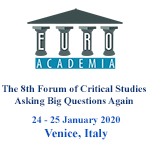Euroacademia Conferences
 Europe Inside-Out: Europe and Europeanness Exposed to Plural Observers (9th Edition) April 24 - 25, 2020
Europe Inside-Out: Europe and Europeanness Exposed to Plural Observers (9th Edition) April 24 - 25, 2020 Identities and Identifications: Politicized Uses of Collective Identities (9th Edition) June 12 - 13, 2020
Identities and Identifications: Politicized Uses of Collective Identities (9th Edition) June 12 - 13, 2020 8th Forum of Critical Studies: Asking Big Questions Again January 24 - 25, 2020
8th Forum of Critical Studies: Asking Big Questions Again January 24 - 25, 2020 Re-Inventing Eastern Europe (7th Edition) December 13 - 14, 2019
Re-Inventing Eastern Europe (7th Edition) December 13 - 14, 2019 The European Union and the Politicization of Europe (8th Edition) October 25 - 26, 2019
The European Union and the Politicization of Europe (8th Edition) October 25 - 26, 2019 Identities and Identifications: Politicized Uses of Collective Identities (8th Edition) June 28 - 29, 2019
Identities and Identifications: Politicized Uses of Collective Identities (8th Edition) June 28 - 29, 2019 The European Union and the Politicization of Europe (7th Edition) January 25 - 26, 2019
The European Union and the Politicization of Europe (7th Edition) January 25 - 26, 2019 7th Forum of Critical Studies: Asking Big Questions Again November 23 - 24, 2018
7th Forum of Critical Studies: Asking Big Questions Again November 23 - 24, 2018 Europe Inside-Out: Europe and Europeanness Exposed to Plural Observers (8th Edition) September 28 - 30, 2018
Europe Inside-Out: Europe and Europeanness Exposed to Plural Observers (8th Edition) September 28 - 30, 2018 Identities and Identifications: Politicized Uses of Collective Identities (7th Edition) June 14 - 15, 2018
Identities and Identifications: Politicized Uses of Collective Identities (7th Edition) June 14 - 15, 2018
The EU’s Endogenous Identity or the ‘Genetic Soup’
-
-

-
Presentation speakers
- Emanuel Crudu, Euroacademia (Paris, Lucca & Brussels)
Abstract:
It is a widespread though not undisputed argument nowadays that the EU is or is becoming a normative power even if often with double standards. That is to make reference to a variable normative commonality or to a set of shared values that the EU is empowering and promoting. Among many normative instruments of EU’s foreign policy, the enlargement was considered the most successful one as it proved to be a powerful instrument through credible incentives to encourage political change and foster substantive democratization. As before the 90s the enlargement was occasional and sporadic, after the end of Cold War, the enlargement was understood more as a function of Western European institutions and particularly of the EU as an emerging pan-European policy shaper. Yet, the enlargement also reminded most of the EU students that the formation of EU institutions is based on particular and historically circumstantial experiences that lead to a specific model of institutionalization. That is to say that specific identitarian narratives, norms and values are endogenous to EU’s formation and gradual institutionalization. Johan P. Olsen (2010) refers to a Western ‘genetic soup’ whose pre-existing components define the viable political choices in the development of new institutions. This ‘genetic soup’, in Olsen’s terms, ‘includes historically developed institutional arrangements, standard operating procedures, practices, rules, roles, identities, normative and causal belief systems, and resources and capabilities’(Olsen 2010: 96). In this line of arguments the EU as institutionalization and policy process ‘is based on west European experience’ (Wallace et al. 2010: 5). This statement is repeatedly made starting the ‘90s by Hellen Wallace as a preliminary observation to her overview of the EU in all the four editions of the well known Policy-Making in the European Union. The dense multilateralism as a specific feature of western politics stays, for Wallace, at the core of EU formation while the enlargement brings to saliency the question whether there is one Europe or several in embracing Central and Eastern European countries with different inheritances. This presentation looks to interrogate whether recent developments and detachments of politics in CEE toward what is called an ‘illiberal trend’ are unintended consequences or spillover effects of the western genetic soup or an autochthonous developments based on rational gains calculus of populist politics. In both cases however, dichotomies emerging in European politics need to be addressed.
-
Related Presentations

The Construction of Urban Space in Honoré Daumier’s Caricatures
- Raphaella Serfaty

Are Some People More Equal than Others? Experimental Evidence on Group Identity and Income Inequality
- Joep Lustenhouwer
- Tomasz Makarewicz
- Juan Carlos Peña
- Christian R. Proaño













